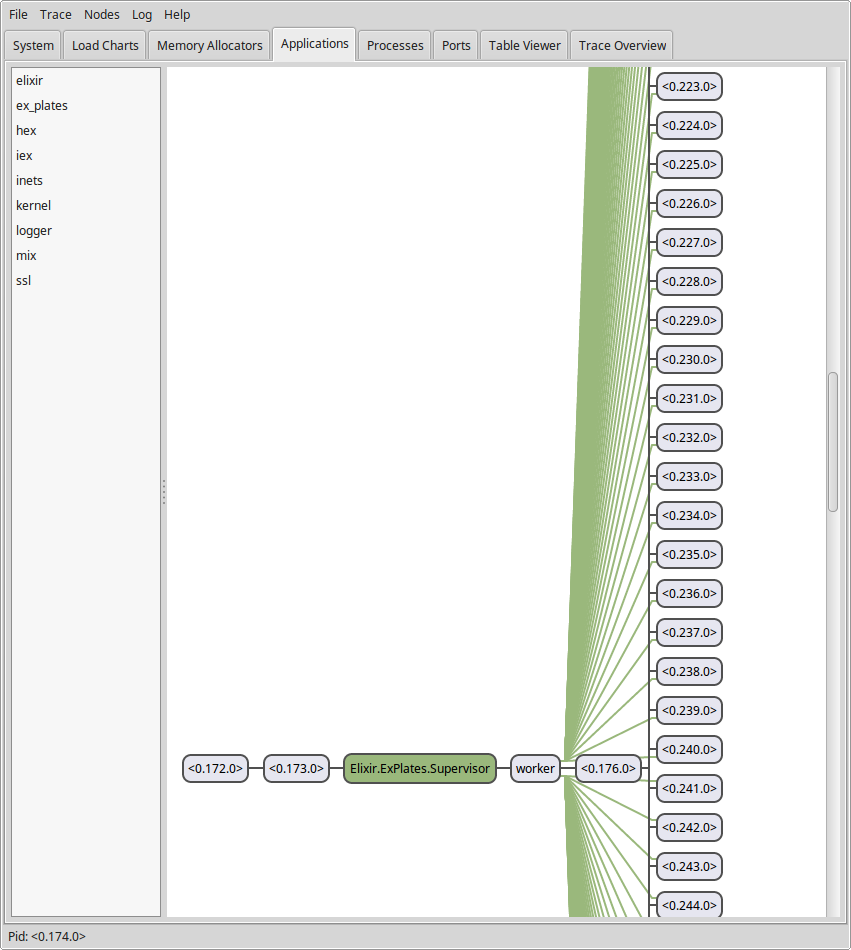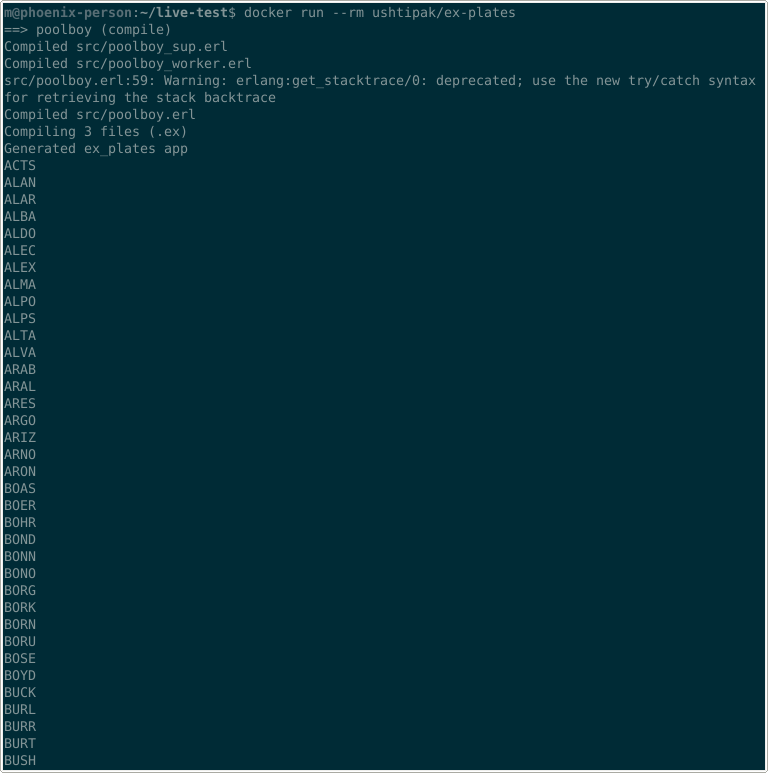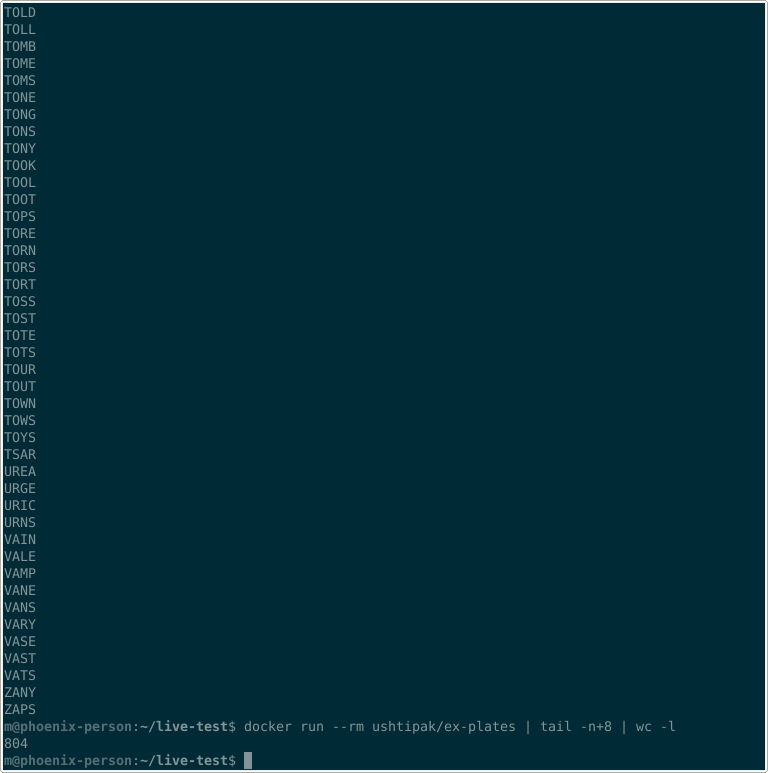Elixir and :observer.start(), since app completion, look like this:

Elixir application process tree
Vehicle registration plates of Serbia, since 2011, look like this:

src: Wikipedia
Simple principle of 2 predefined letters (representing larger cities), 3 to 4 numbers and 2 random letters, e.g:
BO 1234 OBIt’s easy to guess where to go from here – how many valid words can we glue together with these letters – backed with Elixir, poolboy, tiny bit of Go and Docker, as a tech stack
Entrée
It’s not every day that a new city gets build and grows beyond a certain point to get it’s own 2 letter prefix for registration, but hard-coding existing ones is still lame
Closest thing to an official list of currently valid Serbian city codes is by far the Wikipedia entry. Fetching purely region IDs from this location requires some code and either CSS selector or XPath, so Golang and antchfx/htmlquery are called in:
w := bufio.NewWriter(f)
for _, n := range htmlquery.Find(doc, xPath) {
_, err := w.WriteString(htmlquery.InnerText(n) + "\n")
check(err)
}
w.Flush()… with XPath being:
"//*[@id=\"mw-content-text\"]/div/table[1]/tbody/tr[*]/td[1]"Ancient scrolls, c. 320 BC
Main course
Having plate codes retrieved as shown above, supported with a list of American English dictionary words (/usr/share/dict, wamerican:2018.04.16-1), poolboy can be fired up
Elixir playground was bootstrapped via mighty mix and main dish included lib/ex_plates/execute.ex module, alongside lightweight worker.ex
Worker (configured with {:size, 64}, {:max_overflow, 32}) is in charge of ensuring that word being checked indeed starts with 2 letters available in gathered city codes:
def handle_call({word, plate_codes}, _from, state) do
for plate_code <- plate_codes do
is_valid = String.starts_with?(String.downcase(word), String.downcase(plate_code))
if is_valid and not String.contains?(word, "'") do
IO.puts String.upcase(word)
end
end
{:reply, word, state}
endPrimary logic, however, lies in mentioned Execute module
Previously prepared plate_codes are loaded as a list (80 2-letter city prefixes), while the following stream over wordlist_file (wamerican dict) relies extensively on Elixir’s Pipe Operator (taking result of one expression and passing it on, shell-like)
$ wc -l < /usr/share/dict/words
102401Content of given file (~100k words) is streamed as input to a function that gets rid of trailing spaces; that output is fed to a fn which filters only 4 chars phrases, which is further the input sent to poolboy workers (generic pooling lib for Erlang), ones that do the lifting:
defmodule Execute do
@timeout 1000
def start do
plate_codes_file = "/tmp/platecodes"
wordlist_file = "/usr/share/dict/words"
plate_codes = File.stream!(plate_codes_file)
|> Stream.map(&String.trim/1)
|> Enum.to_list
File.stream!(wordlist_file)
|> Stream.map(&String.trim/1)
|> Stream.filter(fn(n) -> String.length(n) == 4 end)
|> Stream.map(fn line ->
Task.async(fn ->
:poolboy.transaction(
:worker,
fn pid -> GenServer.call(pid, {line, plate_codes}) end,
@timeout
)
end)
end)
|> Stream.each(fn task -> task |> Task.await(@timeout) end)
|> Stream.run
end
endDessert
Since bootstrapping a working Elixir workstation is not trivial – let’s use Docker

FROM elixir
MAINTAINER ushtipak@gmail.com
RUN apt-get -y update
# prepare and execute platecodes (golang)
WORKDIR /opt/plates/
RUN apt-get install -y git golang
RUN git clone https://github.com/ushtipak/platecodes.git
WORKDIR /opt/plates/platecodes
RUN GOPATH=$HOME/go go get github.com/antchfx/htmlquery
RUN GOPATH=$HOME/go go run platecodes.go
# prepare and execute ex-plates (elixir)
RUN mkdir -p /opt/plates/ex-plates
WORKDIR /opt/plates/ex-plates
COPY . /opt/plates/ex-plates
RUN apt-get install -y wamerican
RUN mix local.hex --force && mix deps.get
RUN mix local.rebar --force
CMD mix run -e "Execute.start"Sufficiently understandable, here in action:

[ … ]

Compilation messages excluded, getting the final result
TL;DR
Code, code, Docker image – 804 in total